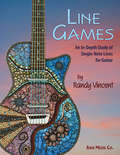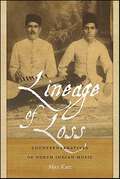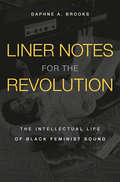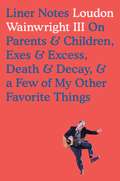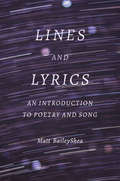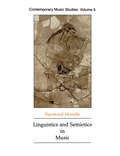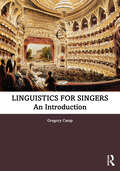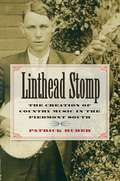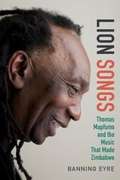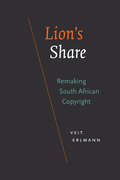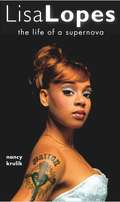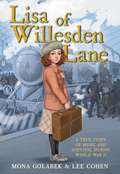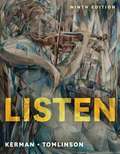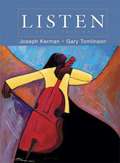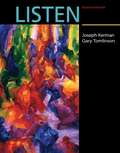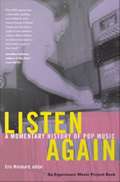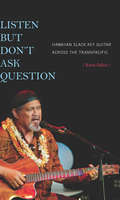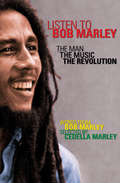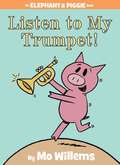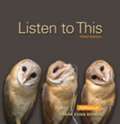- Table View
- List View
Line Games
by Randy VincentLine Games is an organized series of practical studies for the development of single-note guitar technique and jazz vocabulary simultaneously.
Lineage of Loss: Counternarratives of North Indian Music (Music-culture Ser.)
by Max KatzIn the middle of the nineteenth century a new family of hereditary musicians emerged in the royal court of Lucknow and subsequently rose to the heights of renown throughout North India. Today this musical lineage, or ghar n, lives on in the music and memories of only a small handful of descendants and players of the family instrument, the sarod. Drawing on six years of ethnographic and archival research, and fifteen years of musical apprenticeship, Max Katz explores the oral history and written record of the Lucknow ghar n ,tracing its displacement, loss of prestige, and erasure from the collective memory. In doing so he illuminates a hidden history of ideological and social struggle in North Indian music culture, intervenes in ongoing debates over the anti-Muslim agenda of Hindustani music's reform movement, and reanimates a lost vision in which Muslim scholar-artists defined the music of the nation. An interdisciplinary, postmodern counter-history, Lineage of Loss offers a new and unsettling narrative of Hindustani music's encounter with modernity.
Liner Notes for the Revolution: The Intellectual Life of Black Feminist Sound
by Daphne A. BrooksAn award-winning Black feminist music critic takes us on an epic journey through radical sound from Bessie Smith to Beyoncé. Daphne A. Brooks explores more than a century of music archives to examine the critics, collectors, and listeners who have determined perceptions of Black women on stage and in the recording studio. How is it possible, she asks, that iconic artists such as Aretha Franklin and Beyoncé exist simultaneously at the center and on the fringe of the culture industry? Liner Notes for the Revolution offers a startling new perspective on these acclaimed figures—a perspective informed by the overlooked contributions of other Black women concerned with the work of their musical peers. Zora Neale Hurston appears as a sound archivist and a performer, Lorraine Hansberry as a queer Black feminist critic of modern culture, and Pauline Hopkins as America’s first Black female cultural commentator. Brooks tackles the complicated racial politics of blues music recording, song collecting, and rock and roll criticism. She makes lyrical forays into the blues pioneers Bessie Smith and Mamie Smith, as well as fans who became critics, like the record-label entrepreneur and writer Rosetta Reitz. In the twenty-first century, pop superstar Janelle Monae’s liner notes are recognized for their innovations, while celebrated singers Cécile McLorin Salvant, Rhiannon Giddens, and Valerie June take their place as cultural historians. With an innovative perspective on the story of Black women in popular music—and who should rightly tell it—Liner Notes for the Revolution pioneers a long overdue recognition and celebration of Black women musicians as radical intellectuals.
Liner Notes: On Parents & Children, Exes & Excess, Death & Decay, & a Few of My Other Favorite Things
by Loudon WainwrightLoudon Wainwright III, the son of esteemed Life magazine columnist Loudon Wainwright, Jr., is the patriarch of one of America’s great musical families. He is the former husband of Kate McGarrigle and Suzzy Roche, and father of Rufus Wainwright, Martha Wainwright, Lucy Wainwright Roche, and Lexie Kelly Wainwright. With a career spanning more than four decades, Wainwright has established himself as one of the most enduring singer-songwriters who emerged from the late 1960s. Not only does he perform regularly across America and in Europe, but he is a sought-after actor, having appeared in many movies and TV series. There is probably no singer-songwriter who has so blatantly inserted himself into his songs. The songs can be laugh-out-loud funny, but they also can cut to the bone. In this memoir, Wainwright details the family history his lyrics have referenced and the fractured relationships among generations: the alcoholism, the infidelities, the competitiveness—as well as the closeness, the successes, and the joy. Wainwright reflects on the experiences that have influenced his work, including boarding school, the music business, swimming, macrobiotics, sex, incarceration, and something he calls Sir Walter Raleigh Syndrome. Wainwright writes poignantly about being a son—a status that dominates many of his songs—but also about being a parent, a brother, and a grandfather. His lyrics are featured throughout the book, amplifying his prose and showing the connections between the songs and real life. Wainwright also includes selections from his father’s brilliant Life magazine columns—and, in so doing, reestablishes his father as a major essayist of his era. A funny and insightful meditation on family, inspiration, and art, Liner Notes will thrill fans, readers, and anyone who appreciates the intersection of music and life.
Lines and Lyrics: An Introduction to Poetry and Song
by Matt BaileySheaAn introduction to poetry geared toward the study of song &“Fusing an approach that engages both lyrics and musical content of English-language songs in a wide swath of genres, Lines and Lyrics gives readers the tools and concepts to help them better interpret songs, in an accessible and enjoyable format.&”—Victoria Malawey, author of A Blaze of Light In Every Word: Analyzing the Popular Singing Voice &“I can think of no other book that juxtaposes art song and pop song so effectively, in a way that doesn&’t privilege one over the other. This is a real achievement, and a must-have for anyone who loves words and songs.&”—Stephen Rodgers, University of Oregon Bruce Springsteen, Benjamin Britten, Kendrick Lamar, Sylvia Plath, Outkast, and Anne Sexton collide in this inventive study of poetry and song. Drawing on literary poetry, rock, rap, musical theater, and art songs from the Elizabethan period to the present, Matt BaileyShea reveals how every issue in poetry has an important corresponding status in song, but one that is always transformed. Beginning with a discussion of essential features such as diction, meter, and rhyme, the book progresses into the realms of lineation, syntax, form, and address, and culminates in an analysis of two complete songs. Throughout, BaileyShea places classical composers and poets in conversations with contemporary songwriters and musicians (T. S. Eliot and Johnny Cash, Aaron Copland and Pink Floyd) so that readers can make close connections across time, genres, and fields, but also recognize inherent differences. To aid the reader, the author has created a Spotify playlist of all the music discussed in this book and provides time cues throughout, enabling readers to listen to the music as they read.
Linguistics and Semiotics in Music (Contemporary Music Studies #Vol. 5)
by Raymond MonelleThis handbook for advanced students explains the various applications to music of methods derived from linguistics and semiotics. The book is aimed at musicians familiar with the ordinary range of aesthetic and theoretical ideas in music; no specialized knowledge of linguistic or semiotic terminology is necessary. In the two introductory chapters, semiotics is related to the tradition of music aesthetics and to well-known works like Deryck Cooke's The Language of Music, and the methods of linguistics are explained in language intelligible to musicians. There is no limitation to one school or tradition; linguistic applications not avowedly semiotic, and semiotic theories not connected with linguistics, are all included. The book gives clear and simple descriptions with ample diagrams and music examples of the 'neutral level', 'semiotic analysis', transformation and generation, structural semantics and narrative grammar, intonation theory, the ideas of C.S. Peirce, and applications in ethnomusicology.
Linguistics for Singers: An Introduction
by Gregory CampLinguistics for Singers: An Introduction is a textbook and manual that provides singers with a foundation in linguistic features of four major singing languages—English, Italian, French, and German—and shows how these features can be used to inform vocal performance and interpretation. Going beyond the basics of lyric diction, a grounding in linguistics enables student musicians to understand language holistically and more fully comprehend the music they are learning. The comparative approach to four common languages allows readers to readily grasp similarities and apply principles across vocal repertoire. Beginning with the sounds of a language and gradually moving up through larger levels of linguistic structure, from words to full texts, the chapters illustrate concepts using real examples from art songs and opera. The clear explanations enable readers new to linguistics to connect these concepts with their own musical practice. Designed for flexible use in courses on language and singing, lyric diction, repertoire studies, and collaborative piano, this book provides a vital resource for singers, vocal instructors, and conductors.
Linkin Park: The Secret History (The\secret History Of Rock Ser.)
by Alan CrossAlan Cross is the preeminent chronicler of popular music.Here he provides a history of nu metal band Linkin Park.This look at "the best-selling American rock band of the 20th century" is adapted from the audiobook.
Linthead Stomp
by Patrick HuberContrary to popular belief, the roots of American country music do not lie solely on southern farms or in mountain hollows. Rather, much of this music recorded before World War II emerged from the bustling cities and towns of the Piedmont South. No group contributed more to the commercialization of early country music than southern factory workers. In Linthead Stomp, Patrick Huber explores the origins and development of this music in the Piedmont's mill villages. Huber offers vivid portraits of a colorful cast of Piedmont millhand musicians, including Fiddlin' John Carson, Charlie Poole, Dave McCarn, and the Dixon Brothers, and considers the impact that urban living, industrial work, and mass culture had on their lives and music. Drawing on a broad range of sources, including rare 78-rpm recordings and unpublished interviews, Huber reveals how the country music recorded between 1922 and 1942 was just as modern as the jazz music of the same era. Linthead Stomp celebrates the Piedmont millhand fiddlers, guitarists, and banjo pickers who combined the collective memories of the rural countryside with the upheavals of urban-industrial life to create a distinctive American music that spoke to the changing realities of the twentieth-century South.
Lion Songs: Thomas Mapfumo and the Music That Made Zimbabwe
by Banning EyreLike Fela Kuti and Bob Marley, singer, composer, and bandleader Thomas Mapfumo and his music came to represent his native country's anticolonial struggle and cultural identity. Mapfumo was born in 1945 in what was then the British colony of Rhodesia (now Zimbabwe). The trajectory of his career--from early performances of rock 'n' roll tunes to later creating a new genre based on traditional Zimbabwean music, including the sacred mbira, and African and Western pop--is a metaphor for Zimbabwe's evolution from colony to independent nation. Lion Songs is an authoritative biography of Mapfumo that narrates the life and career of this creative, complex, and iconic figure. Banning Eyre ties the arc of Mapfumo's career to the history of Zimbabwe. The genre Mapfumo created in the 1970s called chimurenga, or "struggle" music, challenged the Rhodesian government--which banned his music and jailed him--and became important to Zimbabwe achieving independence in 1980. In the 1980s and 1990s Mapfumo's international profile grew along with his opposition to Robert Mugabe's dictatorship. Mugabe had been a hero of the revolution, but Mapfumo's criticism of his regime led authorities and loyalists to turn on the singer with threats and intimidation. Beginning in 2000, Mapfumo and key band and family members left Zimbabwe. Many of them, including Mapfumo, now reside in Eugene, Oregon. A labor of love, Lion Songs is the product of a twenty-five-year friendship and professional relationship between Eyre and Mapfumo that demonstrates Mapfumo's musical and political importance to his nation, its freedom struggle, and its culture.
Lion's Share: Remaking South African Copyright
by Veit ErlmannIn the aftermath of apartheid, South Africa undertook an ambitious revision of its intellectual property system. In Lion’s Share Veit Erlmann traces the role of copyright law in this process and its impact on the South African music industry. Although the South African government tied the reform to its postapartheid agenda of redistributive justice and a turn to a postindustrial knowledge economy, Erlmann shows how the persistence of structural racism and Euro-modernist conceptions of copyright threaten the viability of the reform project. In case studies ranging from antipiracy police raids and the crafting of legislation to protect indigenous expressive practices to the landmark lawsuit against Disney for its appropriation of Solomon Linda’s song "Mbube" for its hit “The Lion Sleeps Tonight” from The Lion King, Erlmann follows the intricacies of musical copyright through the criminal justice system, parliamentary committees, and the offices of a music licensing and royalty organization. Throughout, he demonstrates how copyright law is inextricably entwined with race, popular music, postcolonial governance, indigenous rights, and the struggle to create a more equitable society.
Liona Boyd 2-Book Bundle: No Remedy for Love / In My Own Key
by Liona BoydExotic venues, sold-out concerts, and the companionship of the world’s most powerful people have given classical guitarist Liona Boyd a lifestyle that, like her music, is one in a million. Both of Liona Boyd’s personal, intimate memoirs are bundled together in this special 2-book collection. Includes: In My Own Key From down-and-out years in Paris, to her affair with Canada’s prime minister Pierre Trudeau, to stages around the world, Liona Boyd has made a lifestyle of crossing boundaries, both musically and romantically. Whether with classical greats or folk legends like Gordon Lightfoot, she has always made music — and lived her life — in her own key. No Remedy for Love A fascinating, personal story of the adventures, romance, and recovery of renowned classical guitarist Liona Boyd. After her divorce and departure from Beverly Hills, Boyd reinvented her career, became a singer-songwriter and the pen pal of Prince Philip, and turned a devastating diagnosis into a new chapter in her life and career.
Lionel Richie (Centerstage)
by Howard Schroeder Teresa KoenigExamines the life of the Alabama musician and songwriter who gained prominence with the Commodores and went on to a highly successful solo career.
Lionel Richie: An Illustrated Biography
by David NathanAs a member of The Commodores, Lionel Richie wrote and performed 'Three Times A Lady', 'Easy' and many other great hits. As a solo artist, he has surpassed even these achievements with songs like 'Hello'.
Lipstick Traces
by Greil MarcusGreil Marcus, author of Mystery Train, widely acclaimed as the best book ever written about America as seen through its music, began work on this new book out of a fascination with the Sex Pistols: that scandalous antimusical group, invented in London in 1975 and dead within two years, which sparked the emergence of the culture called punk. âeoeI am an antichrist!âe#157; shouted singer Johnny Rottenâe"where in the world of pop music did that come from? Looking for an answer, with a high sense of the drama of the journey, Marcus takes us down the dark paths of counterhistory, a route of blasphemy, adventure, and surprise. This is no mere search for cultural antecedents. Instead, what Marcus so brilliantly shows is that various kinds of angry, absolute demandsâe"demands on society, art, and all the governing structures of everyday lifeâe"seem to be coded in phrases, images, and actions passed on invisibly, but inevitably, by people quite unaware of each other. Marcus lets us hear strange yet familiar voices: of such heretics as the Brethren of the Free Spirit in medieval Europe and the Ranters in seventeenth-century England; the dadaists in Zurich in 1916 and Berlin in 1918, wearing death masks, chanting glossolalia; one Michel Mourre, who in 1950 took over Easter Mass at Notre-Dame to proclaim the death of God; the Lettrist International and the Situationist International, small groups of Parisâe"based artists and writers surrounding Guy Debord, who produced blank-screen films, prophetic graffiti, and perhaps the most provocative social criticism of the 1950s and âe(tm)60s; the rioting students and workers of May âe(tm)68, scrawling cryptic slogans on city walls and bringing France to a halt; the Sex Pistols in London, recording the savage âeoeAnarchy in the U. K. âe#157; and âeoeGod Save the Queen. âe#157;Although the Sex Pistols shape the beginning and the end of the story, Lipstick Traces is not a book about music; it is about a common voice, discovered and transmitted in many forms. Working from scores of previously unexamined and untranslated essays, manifestos, and filmscripts, from old photographs, dada sound poetry, punk songs, collages, and classic texts from Marx to Henri Lefebvre, Marcus takes us deep behind the acknowledged events of our era, into a hidden tradition of moments that would seem imaginary except for the fact that they are real: a tradition of shared utopias, solitary refusals, impossible demands, and unexplained disappearances. Written with grace and force, humor and an insistent sense of tragedy and danger, Lipstick Traces tells a story as disruptive and compelling as the century itself.
Lisa Lopes
by Nancy Krulik"Dreams are hopeless aspirations, inhopes of coming true, believe in yourself, the rest is up to me and you." -- "Waterfalls" Tionne "T-Boz" Watkins, Lisa "Left Eye" Lopes, and Rozanda "Chilli" Thomas came together in Atlanta, Georgia, in the early 1990s to form TLC, a group that blended hip-hop, dance, and R&B music so successfully that it went on to be one of the bestselling female groups of all time. This is the story of how Lisa Lopes, the self-proclaimed "crazy" member of TLC, rose above her difficult childhood to attain superstardom. With her funky raps and her vivacious personality, Lisa pursued her dreams and became known as the most energetic member of TLC, who went on to pave the way for many female groups that followed.
Lisa of Willesden Lane: A True Story of Music and Survival During World War II
by Mona Golabek Lee CohenAn inspiring true story about one girl's escape from the Holocaust to become a concert pianist against all odds, made popular by Mona Golabek's acclaimed theatrical performance and the beloved novel The Children of Willesden Lane -- now available in an early chapter book format.In pre-World War II Vienna, Lisa Jura was a musical prodigy who hoped to become a concert pianist. But when enemy forces threatened the city -- especially its Jewish population -- Lisa's parents were forced to make a difficult decision. They secured passage for only one of their three daughters through the Kindertransport, and chose to send gifted Lisa to London for safety. As she yearned to be reunited with her family where she lived in a home for refugee children on Willesden Lane, Lisa's music became a beacon of hope for all of her peers.A story of the power of music to uplift the human spirit, this compelling tribute has moved and inspired hundreds of thousands of students and adults across the globe. Now is the perfect time to bring this timeless story of hope to even younger audiences as Mona Golabek's mission to transform historical testimony into youth empowerment has driven many requests for shorter, illustrated formats. Both a picture book and chapter book will be available.
Listen
by Joseph KermanThe first Norton edition boasts a striking visual design, streamlined pedagogy, and rich online resources. These improvements enhance the engaging musical discussion that has always been the core of this teachable, accessible introduction to music appreciation. Listen helps students develop an understanding of great music; it builds the skills required for engaged listening while using rich biographical and cultural context to situate the music in time and place.
Listen (6th edition)
by Joseph Kerman Gary TomlinsonThis music-appreciation text continues to help transform students into active, insightful listeners. The sixth edition of "Listen" offers the highest quality recordings, the clearest Listening Charts, and the richest cultural contexts to inform students' listening and extends its proven approach into the multimedia environment with new music, new media, and a new look, making it easier than ever to discover the "best" way to listen.
Listen (Eighth Edition)
by Joseph Kerman Gary Tomlinson Vivian KermanA classic music-appreciation text made fresh for today's students. Listen makes music accessible to all with its concise historical and cultural context, compelling composer biographies, and clear Listening Charts. The redesigned Eighth Edition incorporates new perspectives on music since 1900, new repertory, and illuminating discussions to help students synthesize the important concepts of classical music and develop the listening skills to explore it further.
Listen Again: A Momentary History of Pop Music
by Eric WeisbardArguing that pop music turns on moments rather than movements, the essays in Listen Again pinpoint magic moments from a century of pop eclecticism, looking at artists who fall between genre lines, songs that sponge up influences from everywhere, and studio accidents with unforeseen consequences. Listen Again collects some of the finest presentations from the celebrated Experience Music Project Pop Conference, where journalists, musicians, academics, and other culturemongers come together once each year to stretch the boundaries of pop music culture, criticism, and scholarship. Building a history of pop music out of unexpected instances, critics and musicians delve into topics from the early-twentieth-century black performer Bert Williams's use of blackface, to the invention of the Delta blues category by a forgotten record collector named James McKune, to an ER cast member's performance as the Germs' front man Darby Crash at a Germs reunion show. Cuban music historian Ned Sublette zeroes in on the signature riff of the garage-band staple "Louie, Louie. " David Thomas of the pioneering punk band Pere Ubu honors one of his forebears: Ghoulardi, a late-night monster-movie host on Cleveland-area TV in the 1960s. Benjamin Melendez discusses playing in a band, the Ghetto Brothers, that Latinized the Beatles, while leading a South Bronx gang, also called the Ghetto Brothers. Michaelangelo Matos traces the lineage of the hip-hop sample "Apache" to a Burt Lancaster film. Whether reflecting on the ringing freedom of an E chord or the significance of Bill Tate, who performed once in 1981 as Buddy Holocaust and was never heard from again, the essays reveal why Robert Christgau, a founder of rock criticism, has called the EMP Pop Conference "the best thing that's ever happened to serious consideration of pop music. " Contributors. David Brackett, Franklin Bruno, Daphne Carr, Henry Chalfant, Jeff Chang, Drew Daniel, Robert Fink, Holly George-Warren, Lavinia Greenlaw, Marybeth Hamilton, Jason King, Josh Kun, W. T. Lhamon, Jr. , Greil Marcus, Michaelangelo Matos, Benjamin Melendez, Mark Anthony Neal, Ned Sublette, David Thomas, Steve Waksman, Eric Weisbard
Listen but Don't Ask Question: Hawaiian Slack Key Guitar across the TransPacific
by Kevin FellezsPerformed on an acoustic steel-string guitar with open tunings and a finger-picking technique, Hawaiian slack key guitar music emerged in the mid-nineteenth century. Though performed on a non-Hawaiian instrument, it is widely considered to be an authentic Hawaiian tradition grounded in Hawaiian aesthetics and cultural values. In Listen But Don&’t Ask Question Kevin Fellezs listens to Kanaka Maoli (Native Hawaiian) and non-Hawaiian slack key guitarists in Hawai&‘i, California, and Japan, attentive to the ways in which notions of Kanaka Maoli belonging and authenticity are negotiated and articulated in all three locations. In Hawai&‘i, slack key guitar functions as a sign of Kanaka Maoli cultural renewal, resilience, and resistance in the face of appropriation and occupation, while in Japan it nurtures a merged Japanese-Hawaiian artistic and cultural sensibility. For diasporic Hawaiians in California, it provides a way to claim Hawaiian identity. By demonstrating how slack key guitar is a site for the articulation of Hawaiian values, Fellezs illuminates how slack key guitarists are reconfiguring notions of Hawaiian belonging, aesthetics, and politics throughout the transPacific.
Listen to Bob Marley: The Man, the Music, the Revolution
by Bob MarleyAn inspiring collection of poems, meditations, and lyrics by one of the world&’s most revered musical legends Bob Marley&’s music defined a movement and forever changed a nation. Known worldwide for their message of peace and unity, Marley&’s songs—from &“One Love&” to &“Redemption Song&” to &“Three Little Birds&”—have touched millions of lives. This collection is the best of Bob Marley presented in three parts: &“The Man,&” giving an in-depth look into the life of Bob Marley; &“The Music,&” comprising his most memorable lyrics as well as links to many of his songs in iTunes; and &“The Revolution,&” containing his meditations on social equality and the Rastafari movement. Enriched with iconic photographs, Listen to Bob Marley provides insight into a reggae legend, the inspirational man behind the music. This ebook features an introduction by daughter Cedella Marley and an illustrated biography of Cedella including rare photographs from her personal collection.
Listen to My Trumpet! (An Elephant and Piggie Book)
by Mo WillemsMeet Elephant Gerald and Piggie winners of Theodor Seuss Geisel Medals for There is a Bird on Your Head! and Are You Ready to Play Outside? and a Geisel Honor for We Are in a Book! Gerald is careful. Piggie is not. Piggie cannot help smiling. Gerald can. Gerald worries so that Piggie does not have to. Gerald and Piggie are best friends. In Listen to My Trumpet! Piggie can't wait to play her new instrument for Gerald! But is she ready to listen to his reaction?
Listen to This Third Edition
by Mark Evan BondsThe book provides readers with the tools to listen to music, hear the elements, and ultimately expand their musical horizons.
